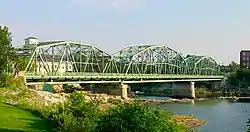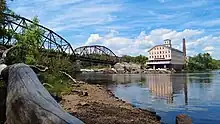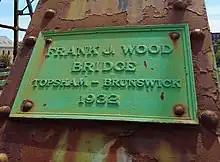Frank J. Wood Bridge
The Frank J. Wood Bridge (known locally as The Green Bridge) is a three span, through truss bridge crossing over the Androscoggin River between the towns of Topsham and Brunswick, Maine, on U.S. Route 201. Opened in 1932, the bridge was originally called the Brunswick-Topsham bridge (as was its predecessor) but was officially renamed the Frank J. Wood Bridge, after a local farmer who suggested the location.
Frank J. Wood Bridge | |
|---|---|
 Frank J. Wood Bridge c. 2021 | |
| Coordinates | 43°55′14.57″N 69°57′57.39″W |
| Carries |
|
| Crosses | Androscoggin River |
| Locale | Topsham/ Brunswick, Maine |
| Other name(s) | Green Bridge |
| Named for | Frank J. Wood |
| Owner | Maine |
| Maintained by | Maine Department of Transportation |
| Heritage status | Eligible for the National Register of Historic Places |
| ID number | ME 2016 |
| Preceded by | Androscoggin Swinging Bridge |
| Followed by | Maine State Route 196 |
| Characteristics | |
| Design | Through Truss |
| Material | Steel and Concrete |
| Total length | 815 feet (248 m) |
| Width | 30.8 feet (9.4 m) |
| Longest span | 310.1 feet (94.5 m) |
| No. of spans | 3 |
| Load limit | 10 short tons (9.1 t) |
| Clearance above | 15.7 feet (4.8 m) |
| Clearance below | 23 feet (7.0 m) |
| No. of lanes | 2 |
| History | |
| Constructed by | Boston Bridge Works |
| Built | 1932 |
| Construction cost | 300,000 US dollars |
| Rebuilt |
|
| Replaces | Brunswick-Topsham Bridge |
| Statistics | |
| Daily traffic | 19,400 vehicles (2010) |
| Location | |
| References | |
| National Bridge Inventory[1] | |
The bridge has met requirements to be considered for the National Register of Historic Places, both as a standalone historic site and as a component of the Brunswick Commercial Historic District. Despite its eligibility, the Maine Department of Transportation (MaineDOT) has initiated the building of a new bridge that will replace the deteriorating Frank J. Wood Bridge by the year 2025.
History
Previous bridges
.jpg.webp)
1827 Bridgewas the first bridge at this location to be supported by stone pillars.
There have been several bridges since the colonial days that have been adjacent to the site of Fort Andross, just below Brunswick Falls, on the Androscoggin river, separating the towns of Topsham and Brunswick, Maine.[2]
The First Bridge, as it was called, was built in the summer of 1796. It was built with wood and was swept away by a freshet (flood) in 1811. The 1811 Bridge was a second wooden bridge that was built, but was also swept away by a flood in 1827. The 1827 Bridge was a third bridge that was built of wood but with its foundation and piers made of stone. This bridge would also have a covered version but was destroyed by a fire in 1842. In 1871, the fourth bridge was built in an open style, and was a toll bridge. Shortly after completion, it was jointly purchased and taken over by the towns of Topsham and Brunswick, made toll free, and known as The Free Bridge. The fifth bridge, was built of light iron, but was swept away by yet another flood in 1896. The Topsham-Brunswick Bridge, also known as the sixth bridge, was constructed in 1897 using stronger iron. However, it was deemed unusable in 1927 following a flood. The Frank J. Wood Bridge opened in 1932 and was the seventh bridge to occupy the location.[2]
Namesake
Frank J. Wood, was the proprietor of a farm in Topsham, Maine and wanted to extend his customer base to Brunswick, however the preceding bridge was destroyed by a flood in 1929 and deemed condemned.[3] Before the bridge was built, he petitioned the state to move the location of the new bridge slightly from where the older bridge was located. He was rewarded for his efforts with the name of the bridge.[3] Wood died only three years after the opening of the Frank J. Wood Bridge in 1935.[3][4]
Design

In 1931 the state of Maine commissioned Boston Bridge Works, of Boston, Massachusetts, to construct a new bridge over the Androscoggin River to replace the old Topsham-Brunswick Bridge that was deemed unsafe.[5] The bridge was made from 1,500 short tons (1,400 t) of steel,[5] as well as concrete, and was originally constructed with tram rails twenty feet apart.[6]
The Frank J. Wood bridge was built to withstand any future floods that may come its way. The great flood of 1936, encapsulating all of New England, destroyed part of the bridge,[7] but it was rebuilt and at full operating capacity within a couple months.[8]
In 1944 the rails from the tram line were paved over with asphalt,[9] after the Maine Central Railroad abandoned the tracks in 1937.[10]
Reconstructions and repairs
In 1972, steel was added to the grid deck. In 1985, repairs were made to the steel grid deck and loose bearings, and all structural steel was repainted.[11]
Eligibility for historic status
After an initial review of the bridge, in 2016, from MaineDOT and the Federal Highway Administration, stating the bridge would not be eligible for the National Register of Historic Places, in 2017, they reevaluated and determined that the Frank J. Wood Bridge was eligible both as an individual historic place and as part of the Brunswick Commercial Historic District. Eligibility is based on its local significance in transportation for its significant association with regional interurban trolley lines. The Federal Highway Administration stated "While most of the features associated with the interurban line are no longer withstanding, the standard width and height of the bridge, set specifically to accommodate the interurban line, was adequate integrity to convey that significance."[12]
Replacement

Even though the Frank J. Wood Bridge is eligible for the National Register of Historic Places, MaineDOT has determined it needs replacement.[13] Preliminary designs for a new bridge would be slightly upstream of the Frank J. Wood bridge, closer to the dam at Pejepscot Falls, have bicycle lanes, pedestrian sidewalks, a viewing area, and public parks on both sides.[14]
In 2015, an inspection of the bridge revealed that both the deck and superstructure were of poor quality,[15] resulting in a reduction of the structural load to 25 short tons (23 t). Another inspection in 2021 revealed that the bridge was deteriorating faster than expected, leading to a further reduction of the structural load to 10 short tons (9.1 t) by MaineDOT.[16]
In 2023, MaineDOT moved forward to replace the Frank J. Wood Bridge with a cost estimate of US$49,900,000 awarding a contract for the new bridge construction to Reed & Reed.[17]
Two-way traffic on the new bridge will not start until late 2025. Furthermore, the construction of the new parks on both sides of the bridge will not be completed until early 2026.[18] The replacement will be the eighth bridge to occupy the location since 1796.[2], with decontruction of the Frank J. Wood bridge to begin in October 2025.[19]
Controversies
1985 protest
On December 16, 1985, Harry C. Crooker and Sons, a construction company, along with other contractors, staged a protest on the bridge, objecting to the long lines of traffic that accumulated. At the time, the Brunswick-Topsham Bypass Advisory Committee along with the state of Maine legislators were attempting to get a bill passed that would ensure a U.S. Route 1 bypass, easing congestion on the bridge. The protest consisted of one hundred and thirty dump trucks and flatbeds crossing over the bridge in a line that went on for 4 miles (6.4 km).[20] The U.S. Route 1 bypass was approved for construction and opened to the public on November 11, 1997.[21]
2019–2023 lawsuits

On September 6, 2019, a lawsuit was submitted to the United States District Court for the District of Maine by the Friends of the Frank J. Wood Bridge, the National Trust for Historic Preservation, and the Historic Bridge Foundation. The plaintiffs of the suit asked the court for an injunction to halt the construction of the new bridge until the state complies with the National Environmental Policy Act of 1970. Plaintiffs claimed the policy act was in violation due to the impact on the fish ladder at the Brunswick hydroelectric plant, adjacent to the bridge. Plaintiffs also claimed in their suit that rehabilitation would be more cost effective than construction of a new bridge, arguing that the state was inaccurate in their cost assessment.[22][23]
On February 3, 2021, federal judge Lance E. Walker of the United States District Court for the District of Maine ruled in favor of MaineDOT in regards to replacing the bridge, with one exception. The exception to the ruling was for the state to reassess their cost estimate for rehabilitation.[24] On March 8, 2021 the three organizations from the 2019 lawsuit filed an appeal to the initial ruling,[25] citing the bridge's eligibility to the National Register of Historic Places.[26] The appeal was denied on January 5, 2022 by the United States Court of Appeals for the First Circuit, citing the state was still responsible for a new assessment for rehabilitating the bridge.[27]
The U.S. district court, on June 16, 2022, ordered the state of Maine to pay 84,000 United States dollars in legal fees due to the state, in their initial report, not assessing the cost of rehabilitation in the correct manner.[28] In January 2023, the state, in their court-ordered re-assessment for rehabilitating the bridge came to the same conclusion, that it would be cheaper to build a new bridge[29] and started the process for construction companies to bid for the job.[17]
A second lawsuit was filed by Friends of the Frank J. Wood Bridge, the National Trust for Historic Preservation, the Historic Bridge Foundation and Waterfront Maine on February 24, 2023. In this lawsuit, the plaintiffs accuse the state of Maine of violating the Department of Transportation Act and the National Environmental Policy Act’s protections on historic sites.[30] As part of the lawsuit, an injunction was filed to try and stop the construction of the new bridge. Judge Lance Walker denied the motion at the end of July 2023.[31] As of August 2023, even though construction of the new bridge has begun, this suit is pending litigation, and a hearing will be held in October 2023.[30]
References
- "National Bridge Inventory Data Sheet" (PDF). historicbridges.org. 2011 – via Federal Highway Administration.
- Christian, Sheldon (May 18, 1963). "Androscoggin River of Rampage at Least 26 Times in 150 Years". Sun Journal (Lewiston, Maine). pp. 1-A, 5-A, 7-A. Retrieved September 7, 2022 – via Newspapers.com.
- "Frank J. Wood: Had Topsham-Brunswick Bridge Named After Him Four Years Ago". Daily Sun. April 13, 1935. p. 2. Retrieved April 9, 2023 – via newspapers.com.
- "State Chat". Lewiston, Maine: Lewiston Evening Journal. February 28, 1932. p. 4. Retrieved August 27, 2022 – via newspapers.com.
- "Topsham Bridges to be Rebuilt – No Expense to Town". Sun Journal (Lewiston, Maine). April 26, 1929. p. 13. Retrieved September 8, 2022 – via newspapers.com.
- "Brunswick: Cong. Beedy's Topic at Rotary "The World Depression"—Salvation Army Tag Day". Daily Sun. October 12, 1931. p. 10. Retrieved September 8, 2022 – via newspapers.com.
- O'Connor, Joe (February 3, 1986). "The flood of '36: Heavy snowfall, record rain and sudden thaw devastated Maine, U.S." The Lewiston Daily Sun. p. 9. Retrieved September 8, 2022 – via newspapers.com.
- "New Service to Mark Rail Time Changes - Service Over Brunswick Bridge Also to Start Sunday". Evening Express. September 21, 1936. p. 1. Retrieved September 10, 2023 – via newspapers.com.
- "Brunswick". The Lewiston Daily Sun. August 4, 1944. p. 9. Retrieved September 8, 2022 – via newspapers.com.
- Cummings, Osmond Richard (1966). "Trolleys to Brunswick, Maine – 1896–1937". National Railway Historical Society. p. 5. Retrieved September 9, 2022 – via Bangor Public Library.
- "Androscoggin Bridge Bids to be Opened". The Lewiston Daily Sun. July 7, 1985. p. 16. Retrieved June 18, 2023 – via newspapers.com.
- Senk, Julie (January 16, 2018). "Addendum to Supplemental Supporting Information for a Finding of Effect" (PDF). MaineDOT. Retrieved September 18, 2022.
- "Main(e) Street Bridge Project". Androscoggin River Walk. Retrieved September 18, 2022.
- "Frank J. Wood Bridge Replacement Virtual tour". RDV Systems. 2018. Retrieved April 9, 2023.
- McGuire, Peter (August 16, 2016). "Brunswick Span Gets Weight Limit". The Times Record (Maine). Brunswick, Maine. Retrieved April 5, 2023 – via newspapers.com.
- Carter, C. Thacher (November 22, 2021). "Commercial vehicles prohibited from using bridge connecting Brunswick and Topsham". The Times Record. Retrieved September 18, 2022.
- Claffey, Jason (April 4, 2023). "$50 million Brunswick-Topsham bridge replacement expected to start this spring". The Times Record. Brunswick, Maine. Retrieved April 7, 2023.
- Bleikamp, Jim (July 22, 2023). "Long Awaited Bridge Work Begins". Radio Midcoast WCME. Brunswick, Maine. Retrieved July 23, 2023.
- "Brunswick bridge set for demolition". Sun Journal. Lewiston, Maine. October 20, 2023. Retrieved October 21, 2023.
- Hammond, Sara (December 16, 1985). "Truckers protest Brunswick bottleneck". Morning Sentinel. pp. 1, 10. Retrieved June 18, 2023 – via newspapers.com.
- "Merrymeeting Bridge is Mommy's Bridge". Sun Journal. Lewiston, Maine. Associated Press. November 12, 1997. p. A2. Retrieved June 18, 2023 – via newspapers.com.
- Hoey, Dennis (September 9, 2019). "Historic preservation groups sue to save iconic Brunswick-Topsham bridge". The Times Record. Retrieved April 3, 2022.
- Friends of the Frank J. Wood Bridge; National Trust for Historic Preservation in the United States; Historic Bridge Foundation, 21-1188 (United States Court of Appeals for the First Circuit 4 January 2022).
- Moore, Darcie (February 3, 2021). "Federal Judge Rules in Favor of MDOT on Brunswick-Topsham Bridge Replacement Suit". The Times Record. Brunswick, Maine. Retrieved April 9, 2022.
- Moore, Darcie (March 10, 2021). "Topsham-Brunswick group files appeal to stop bridge replacement". Portland Press Herald. Portland, Maine. p. B3. Retrieved April 9, 2023 – via newspapers.com.
- Carter, C. Thacher (November 24, 2021). "MaineDOT: 'We will do what we have to' to ensure bridge safety". The Times Record. Brunswick, Maine. pp. A1, A10. Retrieved April 9, 2023 – via newspapers.com.
- Carter, C. Thacher (January 6, 2022). "Court sides with state over plans to replace the Frank J. Wood Bridge". Sun Journal. Lewiston, Maine. p. C6. Retrieved April 9, 2023 – via newspapers.com.
- Terhune, John (June 21, 2022). "Judge Rules Government Must Cover Legal Fees of Town Bridge Proponents". Portland Press Herald. Portland, Maine. pp. B1, B2. Retrieved April 9, 2023 – via newspapers.com.
- Terhune, John (February 4, 2023). "Frank J. Wood Bridge replacement project out for bid". The Times Record. Brunswick, Maine. Retrieved April 9, 2023.
- Terhune, John (March 5, 2023). "Another lawsuit aims to halt Brunswick-Topsham bridge replacement". The Times Record. Brunswick, Maine. Retrieved April 9, 2023.
- Claffey, Jason (July 31, 2023). "Judge denies request to stop construction of new Brunswick-Topsham bridge". The Times Record. Brunswick, Maine. Retrieved August 1, 2023.
External links
- Frank J. Wood Bridge at bridgehunter.com
- Frank J. Wood at MaineDOT
- The Historically Significant Frank J. Wood Bridge at YouTube